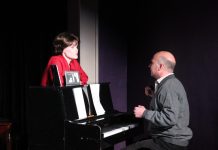“Attention must be paid.” Linda Loman’s famous declaration at the end of Death of a Salesman applies doubly to the title character in August Wilson’s King Hedley II, now playing at Arlington’s Dominion Stage.
And pay attention you will, in a production illuminated by six brilliant performances. Start with Stool Pigeon (Jacqueline E.G. Youm), an at least half-mad prophet who begins and ends the play. “God’s a bad motherfucker,” she repeatedly declares — who has written human destiny, the beginning and the end. People just get to play out what’s in the middle.
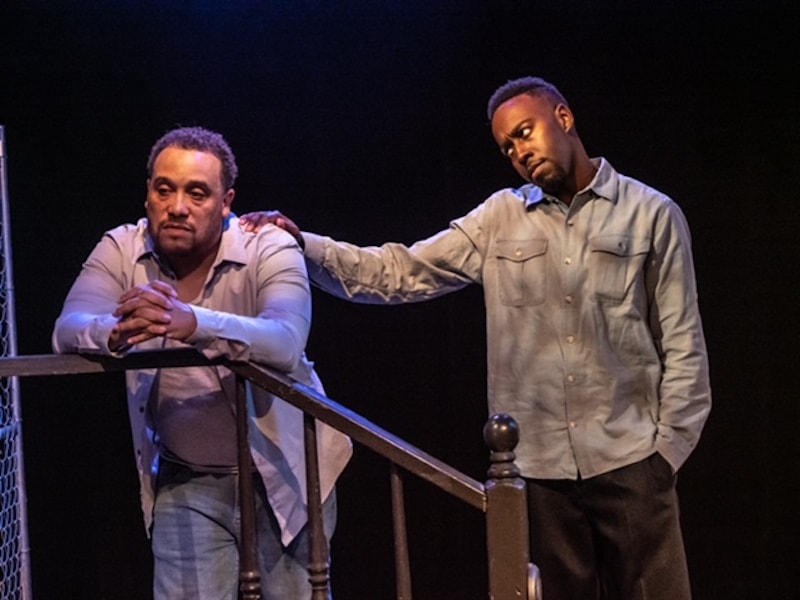
Moving rapidly around the stage, bent over and walking with a limp, delivering her proclamations loudly, with sweeping arm gestures, she occasionally pauses and stands straight up to deliver a quotation from her version of the Bible in a deep, radio-voice–like tone. Youm’s performance is riveting. Stool Pigeon has traditionally been played by a male actor. The role gains power in being played by a woman, though the production retains the script’s original he/him references.
The title character, King (Mack Leamon), demands that attention be paid to him and that his honor and dignity be respected. He insists on hope that somehow things will get better for him, against all odds. The odds are stacked against him. After serving a prison term for killing a man who cut his face with a razor, scarring him physically and emotionally, King lives in a beaten-down Black neighborhood in which deadly violence is an everyday reality. He is chronically short of money, not even being able to pay to connect a phone.
His symbol of hope is a small garden plot, which according to others will not grow because there isn’t “good dirt” there. Other characters make things harder by stepping on it or burying a dead cat there. Wilson does not try to make the metaphor subtle.
In a distorted mirror of faith in the American economic dream, King and his friend Mister (Denzell Massenburg) plan to open a small local video store (the play is set in 1985, the same year that Blockbuster Video opened its first location), financing the venture by selling stolen refrigerators, augmented by proceeds from a jewelry store robbery.
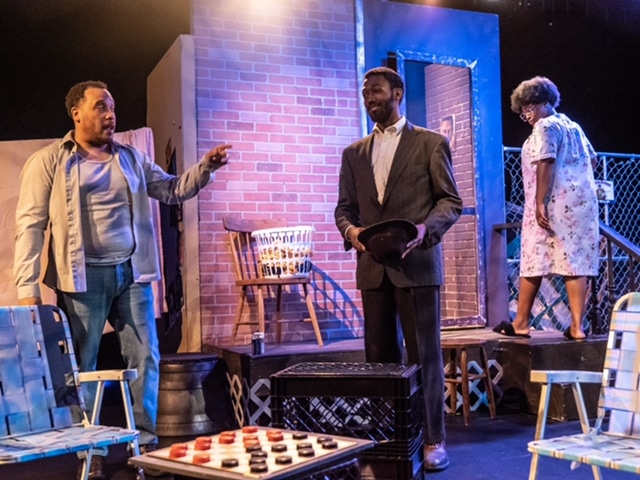
King’s physicality and that of Mister contrast strongly. Mister is all nervous energy, herky-jerky movement, while King has a more stoic presence, albeit with a strong element of anger. Ending the first act, he says, “Everybody better back the fuck off me! … Now they done had World War I … and World War II … the next motherfucker that fucks with me it’s gonna be World War III.” King’s monologue explaining his killing of the man who cut him is one of the show’s highlights (like all the characters, King is an eloquent storyteller of his own life). His gradual growth in taking responsibility for his own actions and tamping down his desire for vengeance is noteworthy.
King’s 35-year-old wife, Tonya (Vanessa McNair), is pregnant. King wants the baby, to leave some mark on the world that he was there. Given the state of their world, Tonya wants an abortion. In the play’s most striking monologue, she says, “I ain’t raising no kid to have somebody shoot him. To have his friends shoot him. To have the police shoot him. Why I want to bring another life into this world that don’t respect life? I don’t want to raise no more babies when you got to fight to keep them alive.” McNair’s physicality in the character respects both Tonya’s sexuality and her need to independently determine her path, apart from King’s needs.
The other woman prominent in King’s life is his mother, Ruby (JoAnn Monplaisir), a one-time singer with a big band whose life is a fabric of regret. She had not been present in King’s growing up, and there is strain between them. Quieter than the other characters, and moving less quickly, Ruby effectively creates a counterpoint to the tone of others in the cast.
Precipitating the play’s final conflict, Elmore (Alanzo Farley) appears, seeking to restart his long-ago relationship with Ruby. A smooth-talking con man, Elmore has no qualms about cheating anyone he encounters. Farley succeeds in portraying someone whose magnetism leads people to follow his lead, even as they know he cannot be trusted.
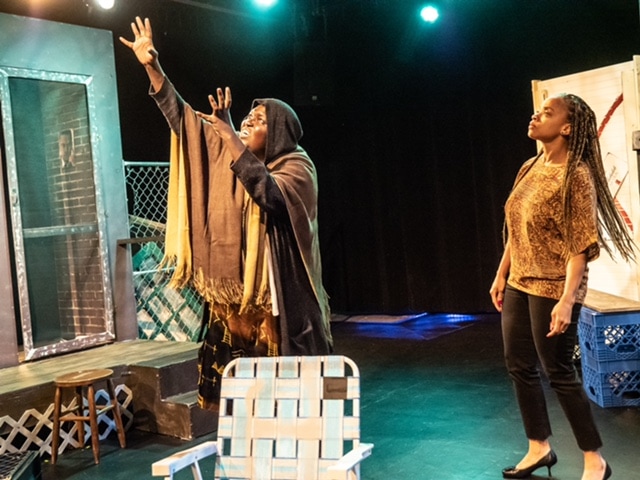
Wilson’s words never fail to be mesmerizing, but King Hedley II has its flaws as well. The narrative meanders at times. There is a too literal application of the “Chekhov’s gun rule,” and a major reveal about King’s parentage that leads to fatal violence is previewed some scenes earlier, both things telegraphing the final outcome. The last-scene change in Elmore’s affect from manipulative to violently angry is jarring and not well prepared for. The theme of the futility of hope, established from the outset, lets the audience know immediately that nothing good will happen for these characters. The suspense is simply that of discovering how their fates will play out.
Director Rikke Howie Lacewell, with her considerable experience in August Wilson’s plays, keeps the show’s momentum moving and has clearly established excellent ensemble playing among the cast members, evident, for example, in scenes in which some characters maintain their interaction with one another silently while the focus is on dialogue between other characters. Reactions are good and timely throughout.
Dominion Stage’s production is up to the material. Sammy Jungwirth’s set is a believable naturalistic depiction of a backyard in a decaying urban neighborhood, though it would have been useful for King’s garden box to be larger, given the prominent role it plays in several scenes. The costumes, designed by Shawn g. Byers, are well suited to each character (e.g., the colorfully wild outfit for Stool Pigeon, featuring black and gold tones; Elmore’s sharp suit; Ruby’s dresses, especially the deep red dress of her final scene). In Shemika Renee’s hair design, there is a nice contrast between Tonya’s flowing, colored hair and Ruby’s afro, though the script’s references to Ruby having gray hair were not incorporated into the design.
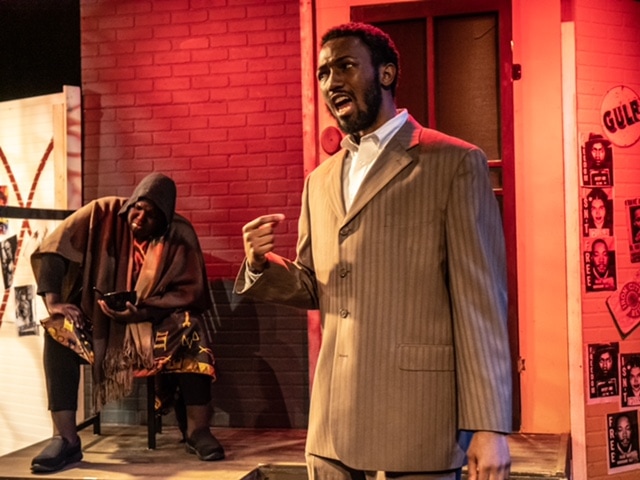
White people are scarcely mentioned in the show, but the overwhelming weight of a society that keeps Black people down, hollows out their communities, and causes individuals to turn on one another is the unspoken context of the play. The passionate attention in King Hedley II to abortion and gun violence has even greater resonance today than in 1999, when it first opened. But what will most remain with the audience of this excellent production of a deeply tragic story is Wilson’s powerful use of language and the equally powerful portrayals by this cast that cause the audience to care about his characters.
Running Time: Two hours 45 minutes, including one intermission.
King Hedley II plays Thursdays, Fridays, and Saturdays at 8 PM through November 5, 2022, presented by Dominion Stage performing at Gunston Arts Center Theatre Two, 2700 South Lang Street, Arlington, VA. Tickets ($25) are available online or at the door.
The program for King Hedley II is online here.
COVID Safety: All audience members are required to be masked while they are in the performance venue.




